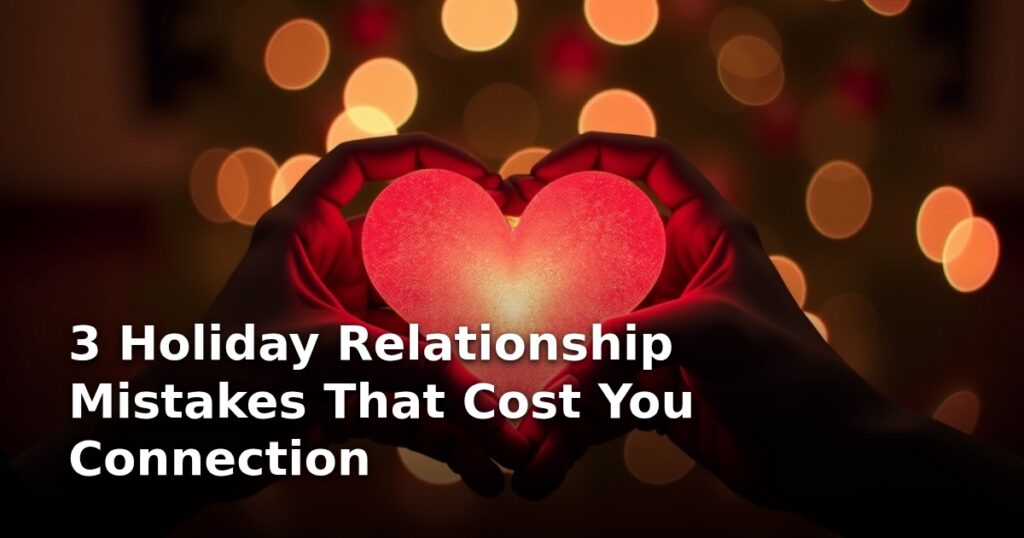3 Holiday Relationship Mistakes That Cost You Connection
The holiday season, often idealized as a time of warmth and togetherness, can paradoxically become a crucible for relationship stress. While we anticipate festive joy, the convergence of heightened expectations, financial strain, and packed schedules often leads couples to inadvertently sabotage the very connection they seek to celebrate. Understanding these common pitfalls is the first step toward safeguarding your bond. This in-depth look at common pitfalls offers essential holiday relationship advice focused on proactive strategies to ensure your connection deepens rather than fractures during this demanding time of year.
Why Relationship Mistakes Surge During the Holidays
The holiday period introduces unique pressures that existing relationship fissures struggle to absorb. Increased logistical coordination, exposure to extended family dynamics, and the pressure to achieve a "perfect" celebration all contribute to emotional overload. When couples are depleted, their default communication settings often revert to reactive and defensive patterns, making small annoyances feel like major conflicts. Recognizing that these mistakes are often rooted in stress—not malice—allows us to approach them with empathy and a focus on actionable solutions.
Mistake #1: Confusing Presence with Genuine Connection
One of the most pervasive errors is assuming that sheer physical proximity equates to emotional intimacy. During the holidays, we are often physically present—attending parties, wrapping gifts, or watching movies—but mentally miles apart.
What the Mistake Is
This mistake involves being physically present with your partner while mentally preoccupied with external stressors: to-do lists, work emails, social obligations, or unresolved family tensions. This often manifests as distracted listening or robotic responses during conversations.
Why People Make It
The sheer volume of tasks associated with the holidays demands significant cognitive bandwidth. Furthermore, many individuals use distraction as a coping mechanism to manage underlying anxiety about the season's performance standards. If you are staying connected during stressful work periods year-round, the holiday influx often compounds this existing habit.
Consequences
The primary consequence is emotional withdrawal. Your partner feels unseen, unheard, and ultimately, unimportant. This can quickly lead to feelings of loneliness within the partnership, which is a significant precursor to signs your partner is pulling away. Superficial engagement erodes deep trust over time.

How to Avoid It and What to Do Instead
Avoid the trap of "ambient togetherness." Instead, schedule and protect intentional, distraction-free time.
Actionable Alternative: Institute a "20-Minute Deep Dive." Every evening, put phones away, turn off the TV, and commit 20 minutes to talking about something other than logistics (gifts, schedules, chores). Use open-ended prompts: "What was the most surprising thing that happened today?" or "What are you looking forward to next week?" This practice is vital for effective communication in marriage.
Mistake #2: Underestimating Holiday-Specific Stressors (Especially In-Laws)
The holidays force extended interaction with family members, which can activate old wounds or exacerbate existing interpersonal friction points.
What the Mistake Is
Failing to proactively discuss and create boundaries around family interactions before they happen, often leading to reactive arguments or one partner feeling unsupported when facing difficult relatives. This is particularly acute when managing in-law relationship stress.
Why People Make It
Many people avoid these difficult conversations because they fear conflict or believe their partner "should already know" how to handle their own family dynamics. They operate under the hopeful, but often flawed, assumption that everything will proceed smoothly.
Consequences
Unmanaged family stress leads to resentment directed toward the partner who seems unable or unwilling to defend boundaries. This can look like one partner constantly apologizing for the other's parent, or one partner feeling abandoned during tense holiday meals.
How to Avoid It and What to Do Instead
Boundary setting must be a team sport. Treat in-law management as a joint strategic operation.

Actionable Alternative: Hold a "Family Strategy Session" early in the season.
- Identify Pain Points: What specific interactions cause stress (e.g., unsolicited parenting advice, political debates)?
- Develop Unified Scripts: Agree beforehand on neutral responses or exit strategies. For example: "That’s an interesting perspective; let’s talk about something lighter."
- Establish Mutual Support Signals: Create a subtle code word or gesture that means, "I need you to step in and redirect this conversation now." This alleviates the pressure on one person to manage the entire interaction alone.
Mistake #3: Letting Expectations Outpace Reality
The media-driven narrative of the perfect holiday—flawless hosting, gourmet meals, and unending cheer—sets an impossibly high bar that few real-life celebrations ever meet.
What the Mistake Is
Allowing external, idealized visions of the holidays to dictate internal relationship satisfaction. When reality inevitably falls short (the turkey burns, the kids are cranky, the decorations are half-done), couples default to blaming each other instead of adjusting expectations together.
Why People Make It
Societal pressure to perform the "perfect holiday" often causes individuals to overcommit or overspend, leading to exhaustion. When exhausted, the ability to pivot gracefully vanishes, and minor failures are interpreted as major relationship shortcomings.
Consequences
This leads to cycles of disappointment and criticism. If you are looking for dating advice for the new year, the foundation must be built on accepting your partner as they are, not as the holiday fantasy requires them to be. Unmet expectations breed chronic dissatisfaction.
How to Avoid It and What to Do Instead
Prioritize connection over performance. Discuss what "enough" looks like for your family this year.
Actionable Alternative: Institute the "Three Must-Haves" Rule. Before the season begins, each partner identifies three non-negotiable elements that truly define a successful holiday for them (e.g., For Partner A: A quiet morning coffee together; For Partner B: One meaningful gift exchange; For Both: No major arguments). Everything else is negotiable or can be skipped if stress levels rise. This reframes success around shared emotional goals rather than arbitrary tasks.

Prevention Strategies: Building Resilience for the Season
To move beyond these common mistakes, adopt preemptive measures that support sustained well-being throughout the busy months.
1. Schedule "Decompression Zones"
If your calendar is packed with social events, you must deliberately schedule white space. These are non-negotiable times reserved solely for rest, reflection, or low-stakes, enjoyable couple time. If you find yourself staying connected during stressful work periods, apply the same scheduling discipline to your personal life.
2. Practice Radical Self-Awareness
Learn to recognize the early signs your partner is pulling away or becoming irritable. Is it fatigue, hunger, or anxiety about an upcoming event? Address the root cause, not just the symptom. Instead of snapping back when criticized, try stating your internal state: "I know I sound short, but I’m feeling overwhelmed by this schedule."
3. Revisit Core Values
Use the quiet moments to remember why you are celebrating together. This reinforces the primary importance of the partnership over the peripheral holiday activities. This fundamental alignment is key to effective communication in marriage when disagreements inevitably arise.
Conclusion: Connection Over Perfection
The holidays are a marathon, not a sprint. By recognizing the subtle traps of mistaking presence for connection, underestimating external stressors, and clinging to unrealistic expectations, you gain the power to navigate this season intentionally. Implementing small, proactive shifts—like dedicating time for deep conversation or setting joint family boundaries—will yield significant returns in relationship satisfaction. Approach this time with grace and self-compassion for both yourself and your partner. The most meaningful gift you can give this season is the gift of focused, authentic connection.



